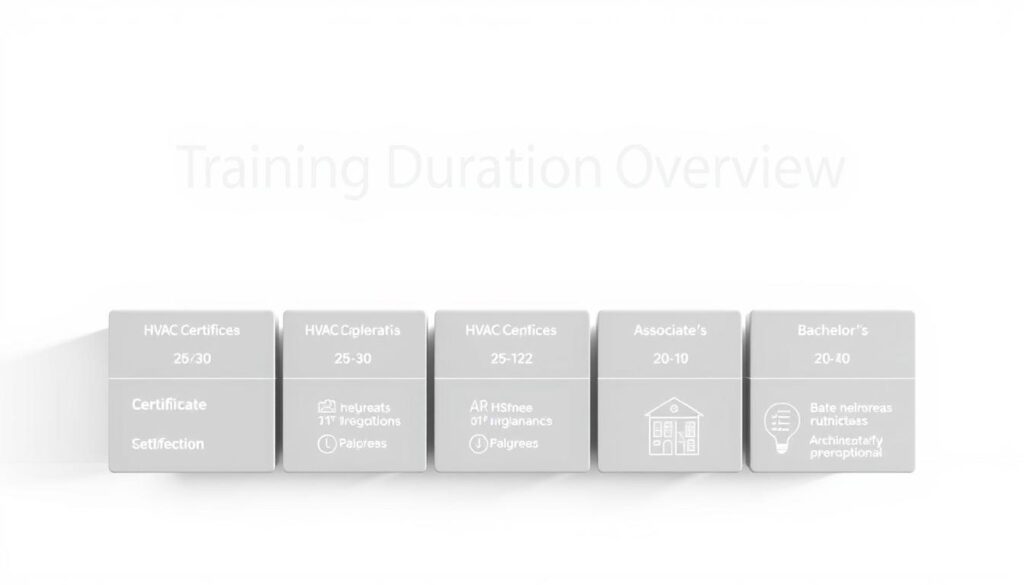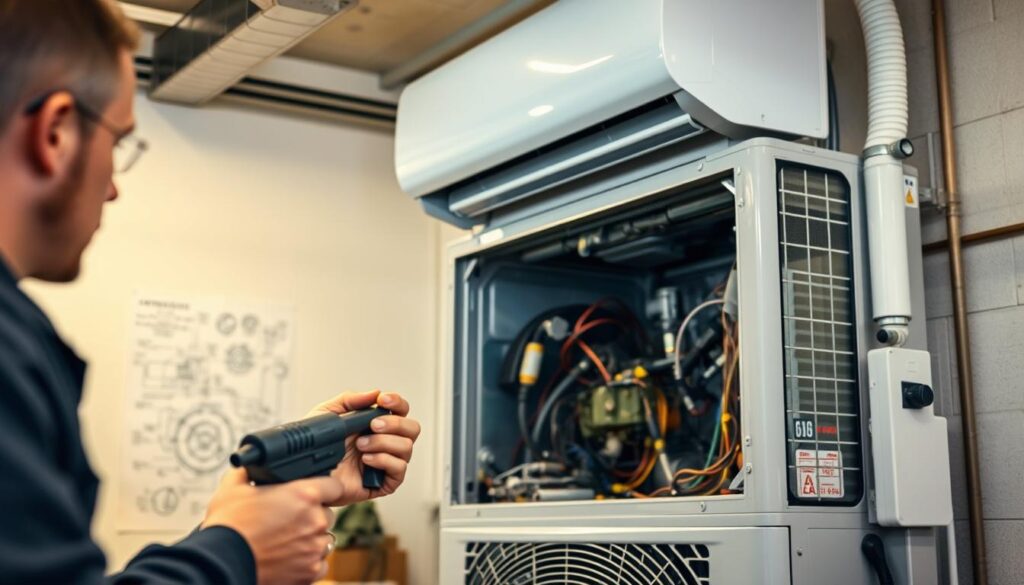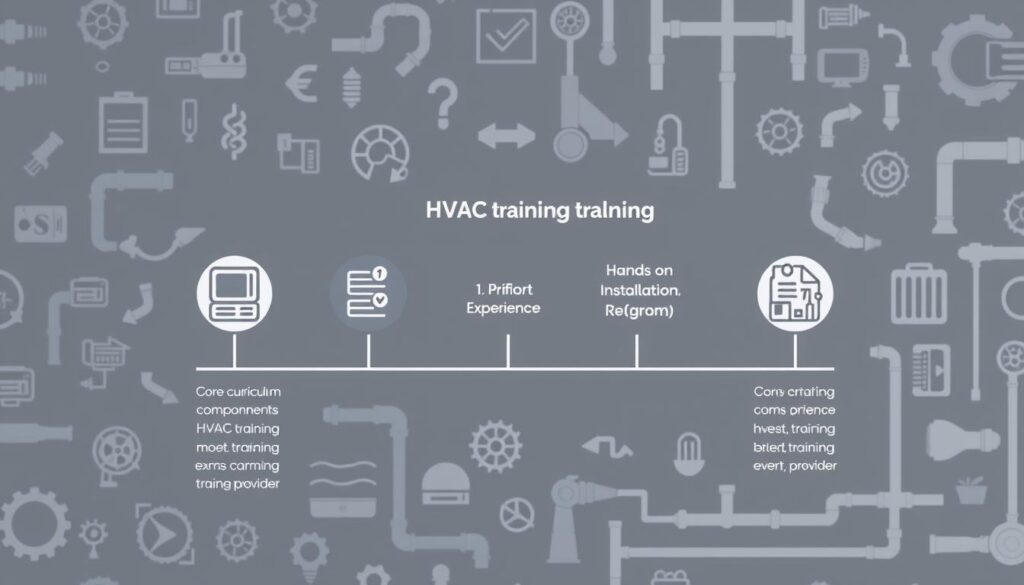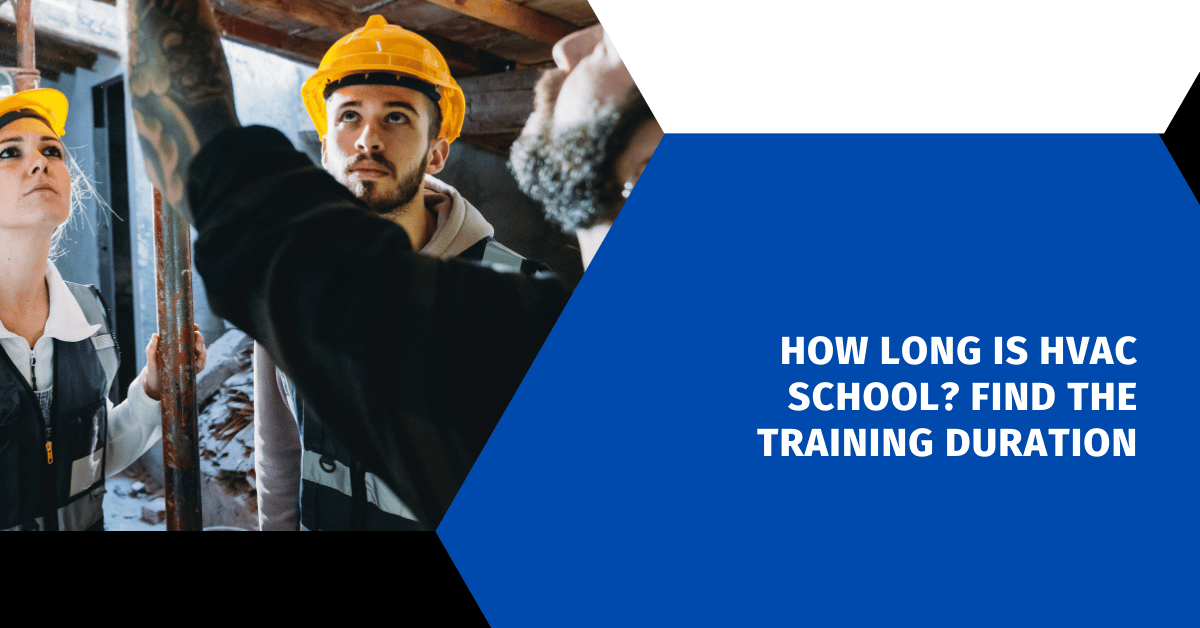How Long is HVAC School? Are you curious about how long it takes to become an HVAC technician? The path to becoming skilled can vary. It ranges from quick certificate programs to longer apprenticeships that last years.

Knowing how long HVAC school lasts is key for those thinking about this career. You can finish training in 6 months or spend up to 5 years on a detailed program. It all depends on your goals and how you learn best.
The HVAC field has many educational paths. Each has its own time commitment and benefits. Whether you want to start working quickly or get a deep technical education, there’s a path for you.
Key Takeaways
- HVAC training can take from 6 months to 5 years
- Certificate programs offer the fastest route to entry
- Associate degrees typically require 2 years of study
- Apprenticeships provide thorough on-the-job training
- Program duration varies by educational institution and career goals
Table of Contents
Understanding HVAC Training Programs and Career Opportunities
The HVAC industry has exciting career paths for those who love technical skills and want job stability. Your hvac education timeline can vary. You can choose from short-term certificates to full degree programs.
The need for skilled HVAC technicians is growing. The US Bureau of Labor Statistics says there will be a 5% increase in jobs from 2021 to 2031. This makes HVAC a great career choice for those looking for long-term success.
Career Prospects and Salary Expectations
Choosing an HVAC career can lead to good money. HVAC technicians make about $48,730 a year, or $23.43 an hour. You could become:
- Residential HVAC Technician
- Commercial HVAC Specialist
- Industrial Refrigeration Technician
- HVAC System Designer
- Energy Efficiency Consultant
Why Choose HVAC as a Career Path
Choosing HVAC as a career has many benefits. Technological advancements in HVAC systems mean you’ll always have something new to learn. HVAC systems are key in modern buildings, so there’s always a need for skilled workers.
Training programs last from 6 months to 3 years. This gives you flexibility in your education. Whether you pick a certificate, associate degree, or apprenticeship, you’ll get hands-on skills for real jobs.
Explore Our HVAC Shop
Looking for top-rated HVAC tools, parts, and accessories? Visit our shop and find the perfect solution for your needs.
Visit the ShopHow Long is HVAC School: Program Duration Overview
Understanding how long HVAC school takes is key for those thinking about a career in heating, ventilation, and air conditioning. The time it takes to finish HVAC training varies a lot. This gives you flexibility, no matter your learning style or career goals.
When looking at HVAC course lengths, you’ll find many paths to choose from:
- Certificate Programs: Usually 6-12 months long
- Community College Programs: About 2 years
- Apprenticeship Programs: 3-5 years of detailed training
Your choice depends on several things. These include your career dreams, how much time you have, and your budget. Short-term certificate programs can start you off fast, with some done in just 6 months. Community colleges offer deeper training, taking around 2 years to finish.
For lots of hands-on experience, apprenticeship programs are the best. They mix 144 hours of classroom learning with 2,000 hours of real-world training each year. This way, you get both book smarts and practical skills.
The right HVAC program can launch your career in a dynamic and growing industry.
Cost is also a big factor in planning your HVAC program. Prices can range from $1,200 to $15,000, based on the training and school. Some employers even pay for your training, which is a great deal for those wanting to save money.
Explore Our HVAC Shop
Looking for top-rated HVAC tools, parts, and accessories? Visit our shop and find the perfect solution for your needs.
Visit the ShopDifferent Types of HVAC Educational Paths
Choosing the right HVAC educational path is key to your career. The length of your hvac schooling varies by program. You can choose from quick certificate programs to full degree tracks.
Knowing the different educational paths helps you decide. Each path has its own benefits and prepares you for different HVAC careers.
Certificate Programs: Quick Entry into HVAC
Certificate programs are the quickest way into HVAC. They take 6-12 months to finish. They’re perfect for those who want to start working fast.
- Average duration: 9 months
- Focused technical training
- Prepare for entry-level positions
- Lower cost compared to degree programs
Associate Degree Programs: More in-Depth Training
An associate degree gives you deeper HVAC knowledge. These two-year programs cover technical skills and general education. They boost your career chances.
- Typical length: 2 years
- Includes general education courses
- Some accelerated options available in 18 months
- Broader understanding of HVAC systems
Apprenticeship Programs: Hands-On Learning
Apprenticeships mix classroom learning with real-world experience. They last 3-5 years. You earn while learning and get valuable skills.
- Duration: 3-5 years
- Paid on-the-job training
- Direct mentorship from experienced technicians
- Comprehensive practical experience
Bachelor’s Degree: Advanced Career Preparation
A four-year bachelor’s degree is for advanced careers. It gives you deep technical knowledge and management skills in HVAC.
Your choice of path depends on your goals, time, and money. Each path has its own way of preparing you for the HVAC industry.
Explore Our HVAC Shop
Looking for top-rated HVAC tools, parts, and accessories? Visit our shop and find the perfect solution for your needs.
Visit the ShopEssential Skills and Knowledge Covered in HVAC Training
Starting HVAC technician training means diving into a detailed curriculum. It’s designed to get you ready for a career in heating, ventilation, air conditioning, and refrigeration. The training time is set to give you key technical skills and practical knowledge.

Your training will focus on important skill areas for success in HVAC:
- Basic electrical systems and motor controls
- Refrigeration principles and safety
- Residential and commercial heating systems
- Air conditioning troubleshooting techniques
- Duct design and load calculation
The length of your HVAC training affects the skills you gain. Students learn essential skills that match real-world job needs.
| Skill Category | Key Learning Outcomes | Industry Relevance |
|---|---|---|
| Electrical Fundamentals | Understanding electrical currents in HVAC equipment | Essential for 90% of HVAC job roles |
| Refrigerant Handling | Safe management of refrigerants | Required for R-410A certification |
| Safety Standards | OSHA compliance and workplace safety | Critical for 90% of employers |
Green technology awareness is a big part of HVAC training now. With 40% of companies looking for techs who know about energy-efficient systems. Your training will get you ready for today’s and tomorrow’s HVAC tech.
Completing a full HVAC training program makes you ready for many challenges. You’ll be a key player in residential, commercial, and industrial settings. This makes you very valuable in this fast-changing field.
Certification Requirements and Licensing Timeline
Understanding the certification process is key for your HVAC career. Knowing the length and requirements of HVAC certification helps plan your path.
HVAC pros need several certifications to prove their skills. The process includes many steps and special credentials. These show your technical know-how.
EPA Section 608 Certification Process
The Environmental Protection Agency (EPA) requires Section 608 certification for refrigerant handlers. This is vital for both environmental safety and professional standing.
- Type I: Small appliances
- Type II: High-pressure appliances
- Type III: Low-pressure appliances
- Universal: Covers all refrigeration systems
State-Specific Licensing Requirements
Licensing rules differ by state, so it’s key to check local laws. The length of your HVAC certification can be affected by state rules.
| State | Licensing Requirement | Typical Duration |
|---|---|---|
| Michigan | Mechanical Contractor License | 3+ years experience |
| Texas | Certification Exam | Post-training requirement |
| California | State Board Certification | Varies by specialization |
NATE Certification Options
NATE certification is optional but highly valued. It shows your specialized skills and boosts your credibility.
- Installation Certification
- Service Certification
- Senior Technician Certification
Getting these certifications can greatly improve your career and earnings in HVAC.
Explore Our HVAC Shop
Looking for top-rated HVAC tools, parts, and accessories? Visit our shop and find the perfect solution for your needs.
Visit the ShopFactors Affecting HVAC Training Duration

Your HVAC training time can change a lot based on several important factors. Knowing these helps you plan your education better.
How fast you learn affects your training time. Some people pick up technical skills quicker than others. This can change how long it takes to finish the course.
- Prior experience in related fields can speed up learning
- How much you study and your study habits matter
- Whether the program fits your learning style
The HVAC training program you pick affects how long it takes. Different paths have different times:
| Program Type | Typical Duration | Key Characteristics |
|---|---|---|
| Certificate Program | 6-12 months | Quick entry into the field |
| Associate Degree | 2 years | Comprehensive technical education |
| Apprenticeship | 3-5 years | Hands-on training with classroom instruction |
Professional tip: Your personal life and how you learn will greatly affect your training time.
“Continuous learning is the key to success in the HVAC industry” – HVAC Industry Expert
Things like new tech and changing rules also make training harder. HVAC systems keep changing. You’ll need to keep learning and adapting to stay ahead in your career.
Choosing Between Full-Time and Part-Time HVAC Programs
When looking at HVAC programs, your schedule and personal life are key. The length of your program can change a lot, depending on if you go full-time or part-time.
Today, students have many flexible learning options. These fit different lifestyles and work needs. How fast you can start working will depend on your program’s length.
Flexible Learning Alternatives
- Evening classes for working professionals
- Weekend training sessions
- Online learning modules
- Hybrid programs combining in-person and digital instruction
Program Completion Considerations
Full-time HVAC programs usually take less time, finishing in 6-12 months. Part-time options might take 18-24 months. Each option has its own benefits:
- Full-Time Benefits:
- Quicker program completion
- Intensive skill development
- Immersive learning experience
- Part-Time Benefits:
- Ability to work while studying
- More flexible scheduling
- Reduced financial strain
Think about your personal life, money situation, and career goals when picking your HVAC program. Some schools offer career help and networking, helping you in your career, no matter your study format.
Explore Our HVAC Shop
Looking for top-rated HVAC tools, parts, and accessories? Visit our shop and find the perfect solution for your needs.
Visit the ShopCost Considerations and Financial Investment Timeline
Understanding the costs of HVAC education is essential. Your hvac education timeline shows the different costs of training programs. These costs vary widely, from $1,500 to $30,000, depending on your choice of education.
When looking at HVAC training costs, you’ll find different pricing:
- Certificate Programs: $1,200 – $15,000
- Associate’s Degree: $15,000 – $35,000
- Additional Expenses: $500 – $1,000 for books and supplies
- Licensing Exam Fees: $50 – $150
Students can use various financial strategies to handle costs. Community colleges are often cheaper than private schools. Online HVAC training programs may offer lower costs and greater flexibility, helping you balance school with life.
There are ways to get financial help:
- Scholarships specific to trade education
- Federal and state grants
- Employer tuition reimbursement programs
- Student loans with flexible repayment options
Flexible payment plans are important in your hvac education timeline. Many schools offer plans for smaller payments without extra interest. By planning your finances well, you can save money while starting a new career.
Conclusion
Choosing the right HVAC training is a big decision that shapes your future. The time it takes to prepare for an HVAC career varies. It can be from eight weeks to two years, depending on the program you pick.
Knowing your options helps you find the best fit for your goals. This ensures you’re on the right path.
HVAC technicians with more education earn more over their careers. Those with an associate’s degree can earn up to $200,000 more than those with just a high school diploma. This shows why investing in good HVAC training is key to a better career.
When planning your HVAC career, consider both practical learning and certification needs. Think about your personal life too. You might choose a short certificate program or a two-year associate degree. Each has its own benefits.
Look at the program’s length, cost, and how it might boost your salary. This helps you make a smart choice for your education.
Remember, learning and improving your skills are ongoing in the HVAC field. By picking the right training and keeping up with new tech, you can have a fulfilling and well-paying career.
FAQ
How long does it typically take to complete HVAC training?
Do I need certification to work as an HVAC technician?
Can I work while attending HVAC school?
What is the average cost of HVAC training?
How long does it typically take to complete HVAC training?
Do I need certification to work as an HVAC technician?
Can I work while attending HVAC school?
What is the average cost of HVAC training?
FAQ
How long does it typically take to complete HVAC training?
HVAC training can last from 6 months to 4 years. This depends on the program you choose. Certificate programs take 6-12 months, associate degrees about 2 years, and apprenticeships 3-5 years.
Your choice will depend on your career goals and how much time you have. It also depends on how deep you want to dive into technical knowledge.
Do I need certification to work as an HVAC technician?
Yes, you need the EPA Section 608 Certification for refrigerants. Many employers also want NATE certification. Check local laws for state-specific licensing.
Can I work while attending HVAC school?
Many programs offer part-time and evening classes. This lets you work and study at the same time. Some schools even have weekend and online classes for more flexibility.
What is the average cost of HVAC training?
Costs range from
FAQ
How long does it typically take to complete HVAC training?
HVAC training can last from 6 months to 4 years. This depends on the program you choose. Certificate programs take 6-12 months, associate degrees about 2 years, and apprenticeships 3-5 years.
Your choice will depend on your career goals and how much time you have. It also depends on how deep you want to dive into technical knowledge.
Do I need certification to work as an HVAC technician?
Yes, you need the EPA Section 608 Certification for refrigerants. Many employers also want NATE certification. Check local laws for state-specific licensing.
Can I work while attending HVAC school?
Many programs offer part-time and evening classes. This lets you work and study at the same time. Some schools even have weekend and online classes for more flexibility.
What is the average cost of HVAC training?
Costs range from $1,200 for short-term programs to $30,000 for associate degrees. Financial aid and scholarships can help. Remember, HVAC technicians often earn well.
What skills will I learn during HVAC training?
You’ll learn about electrical basics, refrigeration, and system installation. You’ll also get hands-on experience with heating, cooling, and ventilation systems.
Is HVAC a good career choice?
HVAC is a great career with good job prospects and salaries. The Bureau of Labor Statistics says jobs will grow 5% by 2030. There’s demand in homes, businesses, and industries.
Can I complete HVAC training online?
Some online courses are available, but hands-on training is key. Many schools offer hybrid programs. These mix online learning with in-person training for a well-rounded education.
What are the prerequisites for HVAC training?
You need a high school diploma or GED. Some schools want basic math and science skills. Being physically fit is important for the job.
Having mechanical skills and problem-solving abilities is also helpful.
How quickly can I start working after completing HVAC training?
After a certificate or associate degree, you can start working right away. But, getting full certification and experience may take 1-2 years. Apprenticeships often lead to jobs with on-the-job training.
Are there specialization options in HVAC training?
Yes, you can specialize in areas like residential systems or commercial refrigeration. Advanced certifications and education can help you become an expert in specific HVAC areas.
,200 for short-term programs to ,000 for associate degrees. Financial aid and scholarships can help. Remember, HVAC technicians often earn well.
What skills will I learn during HVAC training?
You’ll learn about electrical basics, refrigeration, and system installation. You’ll also get hands-on experience with heating, cooling, and ventilation systems.
Is HVAC a good career choice?
HVAC is a great career with good job prospects and salaries. The Bureau of Labor Statistics says jobs will grow 5% by 2030. There’s demand in homes, businesses, and industries.
Can I complete HVAC training online?
Some online courses are available, but hands-on training is key. Many schools offer hybrid programs. These mix online learning with in-person training for a well-rounded education.
What are the prerequisites for HVAC training?
You need a high school diploma or GED. Some schools want basic math and science skills. Being physically fit is important for the job.
Having mechanical skills and problem-solving abilities is also helpful.
How quickly can I start working after completing HVAC training?
After a certificate or associate degree, you can start working right away. But, getting full certification and experience may take 1-2 years. Apprenticeships often lead to jobs with on-the-job training.
Are there specialization options in HVAC training?
Yes, you can specialize in areas like residential systems or commercial refrigeration. Advanced certifications and education can help you become an expert in specific HVAC areas.

